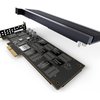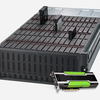Chip startup Lightmatter has received an infusion of $11 million from investors to help bring the worlds first silicon photonics processor for AI to market. Using technology originally developed at MIT, the company is promising orders of magnitude performance improvements over whats feasible using existing technologies.
Ampere Computing, a chip startup headed by former Intel president Renee James, emerged from stealth mode this week, announcing it will be delivering a 64-bit ARM processor for the hyperscale market.
The popularity of NVIDIAs Tesla V100 GPUs got another boost this week with IBMs announcement that it has added them to its cloud offerings.
Episode 210: Addison Snell and Michael Feldman ponder the DOE's mystery Aurora architecture and Atos' 12-Petaflop German installation.
Samsung Electronics has released its first-generation Z-SSD product, a high-performance solid state drive that is meant to compete with Intels Optane SSDs.
According to a news report in Peoples Daily Online, China is planning to launch a pre-exascale supercomputer this year that could outperform Summit, a US machine developed for the Department of Energy that is expected to top 200 petaflops when deployed later this year.
New Zealand-based storage start-up Nyriad has teamed up with Netlist and HPC Systems to develop a Linux storage platform accelerated by GPUs and NVDIMMs.
The Department of Energy (DOE) is soliciting proposals for research projects that will receive early access to Aurora, the first exascale supercomputer to be deployed in the US. Theres one catch though: the DOE is not telling anyone about machines architecture.
Episode 209: Addison Snell and Michael Feldman analyze this week's big HPC stories, including two new Petaflop installations and a big leap forward for AI.
Forschungszentrum Jlich has contractedAtos to build and deploy a 12-petaflop supercomputer, which, when operational, will be the most powerful system in Germany.








